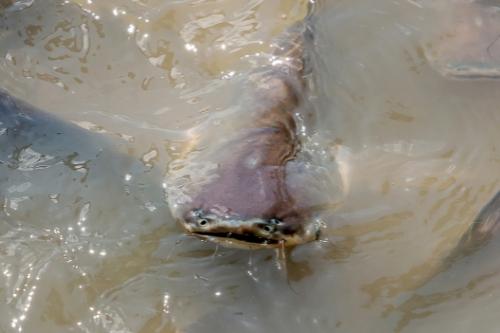One of the most important aspects related to catfish fishing is without a doubt the different types of baits. There are several types of very efficient and effective baits and others that are not so effective.
Without a doubt, among the most used we can highlight the chicken livers. Many fishermen think that chicken livers are the most overrated and overhyped catfish bait we can find.
Chicken liver is an effective catfish bait, but it shouldn’t be used as a “go-to” bait because it’s messy, tough to maintain on the hook, and, in general, there are far more efficient baits for catfish obtainable that are much simpler to use and far more remarkable for its effectiveness-price
Chicken livers, on the other hand, attract catfish from a wide area due to their strong, meaty odor. Once these types of fish smell the bait, they will have problems resisting them. It is important to note that this type of bait may work better on certain types of catfish than others. For example, flathead catfish will prefer live fish as bait than chicken liver.
Table of Contents
Additional Scents for Chicken Livers
While chicken livers have strong colors and odors that easily attract a catfish, some anglers prefer to add additional colors and scents to them to increase effectiveness and efficiency while fishing.
In the case of scents, many fishermen choose to use vanilla, garlic, anise, and on some occasions, asafetida (it is a spice used in Indian dishes). These ingredients are usually added to a bucket with fresh chicken livers to infuse the scent into them.
Similarly, the color of bait is important in attracting catfish. Catfish are generally attracted to bold and vibrant colors like yellow, red, orange, etc. Soaking chicken livers in red food coloring is a popular technique.
Many individuals have said throughout the decades that this increases the level of effectiveness, and that catfish will hit these baits with added red coloration but not the unmodified ones.
How to Keep Chicken Livers on the Hook?
It is important to note that one of the main disadvantages of chicken livers is that they cannot be easily held on hooks. Once they’ve been in the water for a few minutes, they harden up. However, if you’re not careful, you can end up throwing this bait considerably further than your hook goes.
There are certain ways to keep chicken livers on a hook. Some of them are:
- Fresh chicken livers must always be used. That is, those that haven’t been frozen before. Most grocery stores are selling frozen chicken livers, but other places also sell fresh ones that have never been in a refrigerator.
The procedure of defrosting and refreezing causes them to become mushy, making them difficult to keep on the hook. The fewer freezes they get, the stiffer they will become and the better they will remain on the hook. - Make sure you’re using a razor-sharp knife. The majority of people’s cutting methods tear down the liver, causing it to become mushy. The membranes in the liver will be less likely to break down if you use a nice sharp fillet knife and make the minimum cuts you should make.
- Don’t forget to keep the chicken livers chilled. When the chicken livers begin to heat up or become warm, they begin to become mushy and hard to maintain on the hook. This can be minimized by keeping them on ice.
- You might want to utilize a specific hook. When catfishing, liver hooks (which are similar to treble hooks but have 2 barbs instead of 3) include a larger shank and a metal clip that allows keeping the liver on the hook.
Is It Possible to Add Chicken Livers to Other Baits?
The answer is yes! In fact, it’s fairly typical for people who make their own catfish bait to use livers in their preparations. Many of these recipes call for blending or grinding the livers before putting them to a dough bait or even a cheese-based bait.
When Do Chicken Livers Work Best to Catch Catfish?
Where smaller blues or channel catfish are the major attraction and currents aren’t too strong, chicken livers perform well. Super strong currents, such as those found in dam tailraces, frequently shred livers from hooks before the catfish have a chance to find and devour the bait.
It’s vital to remember that livers perform effectively for the first 15 to 20 minutes after being hooked. They lose lots of their original fluids, as well as a lot of their attraction, with time. That is one of the reasons why fishermen add additional and stronger scents.
Keep in mind that chicken livers are not the only livers you can use to catch catfish. You can use turkey livers that can hold even longer on a hook than chicken livers.

